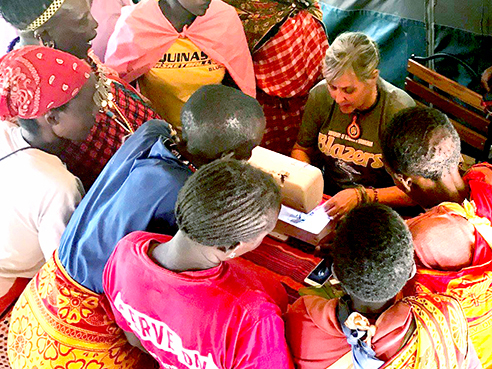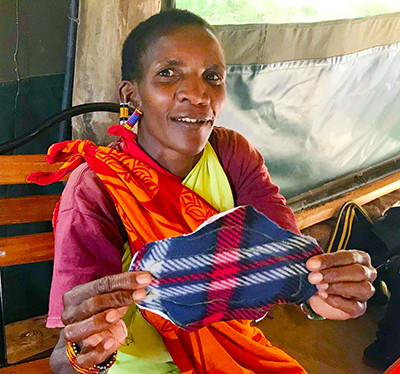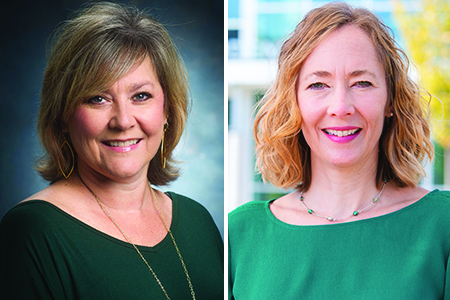 Social Work Professor Stacey Moak, who developed the education abroad program to Kenya in 2018, is pictured in a pre-pandemic photo teaching women to use a sewing machine.As a sophomore, Morgan Rozek traveled to Kenya as part of a service-learning course focused on women’s rights, health and politics. She knew the experience would bolster her public health studies, but she didn’t expect to learn to sew.
Social Work Professor Stacey Moak, who developed the education abroad program to Kenya in 2018, is pictured in a pre-pandemic photo teaching women to use a sewing machine.As a sophomore, Morgan Rozek traveled to Kenya as part of a service-learning course focused on women’s rights, health and politics. She knew the experience would bolster her public health studies, but she didn’t expect to learn to sew.
Students enrolled in PSC 395/495, “Women’s Rights, Health and Politics in Kenya,” spend one week in service with the people of Nashulai Maasai Conservancy in the Maasai Mara, a large national game reserve in Narok, Kenya. But before departing for the remote village, those students worked with the nonprofit Bib & Tucker Sew-Op in Avondale to learn some basic sewing skills.
“Most of our students do not have any sewing experience. It is perhaps something their grandmothers or great-grandmothers did, but our students may not feel the skill is relevant to today,” said Stacy Moak, Ph.D., professor of social work in UAB’s College of Arts and Sciences. “But those skills make a tremendous difference in our partnership in Kenya.”
Following the local lead
While abroad, students in PSC 395/495 work directly with local facilitators to design interventions and lesson plans that are relevant to the needs of the people of the Maasai Mara.
“Our program is a partnership; we stand with the people of Massai Mara and look to them for direction on ways our students can be helpful,” Moak said. “We recognized that girls were missing school because of their menstrual cycles. We worked with facilitators to determine what would be the best intervention to address this issue. With guidance, we determined that reusable sanitary pads would be a tool to keep girls in school.”
Moak, who developed the education abroad program to Kenya in 2018, learned that there are additional opportunities for engagement and long-term partnerships. She and Tina Kempin Reuter, Ph.D, director of UAB’s Institute of Human Rights, collaborated with Maggie Koshal Reiyia and Nelson Ole Reiyia, UAB’s primary partners at Nashulai Conservancy, to reframe the program, make it more sustainable and focus on women’s empowerment in a more holistic way.
With funding Reuter and Moak received from Birmingham’s Independent Presbyterian Church Foundation (IPCF), students and instructors produced approximately 250 sanitary napkins for the return trip in 2019 and purchased a sewing machine to take with them to Massai Mara. Students taught tribal women to sew the napkins and instructed the girls on the way to use them.
“[The course] enabled me to participate in an incredible adventure but also really challenge myself, increase my cultural competency, practice flexibility and learn in so many ways.” |
Rozek, who now is a UAB graduate enrolled in a master’s degree program in the London School of Hygiene and Tropical Medicine, said the experience in Kenya helped her learn ways to collaborate and build targeted public health and educational interventions with limited resources.
“Part of the research I conducted for the course examined the need for comprehensive and accurate education and access to physical resources in addition to analysis of feedback regarding community acceptability of the program,” Rozek said.
Rozek says she was drawn to the course because the topic of women’s health and rights aligned with her public health interests.
“The course provided an opportunity for growth in both an educational and personal sense. I developed and taught lesson plans. I learned to sew. I experienced a new culture. I went on my first safari. I witnessed public health challenges I had only read about in textbooks, and I developed new friendships,” she said. “It enabled me to participate in an incredible adventure but also really challenge myself, increase my cultural competency, practice flexibility and learn in so many ways.”
Powering a partnership
One challenge the partners at Nashulai Conservancy face is lack of reliable access to electricity.
 Because of the new skills, grant-funded sewing machines and solar panels, the women in the Massai community have been able to quickly pivot during the pandemic to tailor masks for the community.The power provided by the panels provides additional community benefits, Reuter said. “Children can frequent the community center’s library during extended hours, and computers have been installed.”“The sewing project has been so significant in empowering women, but it was difficult to keep the sewing machine going without reliable electrical power. We thought about getting manual sewing machines, but they proved difficult to access. With Maggie’s and Nelson’s input, we decided to apply for an additional IPCF grant to buy solar panels for the Massai Mara Women’s Empowerment Center,” Reuter said. The process was a bit delayed because of the pandemic, but the center now is fully equipped and can power about 12 sewing machines, which enables the women in the community to produce sanitary pads and other products independently.
Because of the new skills, grant-funded sewing machines and solar panels, the women in the Massai community have been able to quickly pivot during the pandemic to tailor masks for the community.The power provided by the panels provides additional community benefits, Reuter said. “Children can frequent the community center’s library during extended hours, and computers have been installed.”“The sewing project has been so significant in empowering women, but it was difficult to keep the sewing machine going without reliable electrical power. We thought about getting manual sewing machines, but they proved difficult to access. With Maggie’s and Nelson’s input, we decided to apply for an additional IPCF grant to buy solar panels for the Massai Mara Women’s Empowerment Center,” Reuter said. The process was a bit delayed because of the pandemic, but the center now is fully equipped and can power about 12 sewing machines, which enables the women in the community to produce sanitary pads and other products independently.
Ashley Neyer, director of UAB’s Education Abroad, says the work being done with this Kenya partnership is remarkable: “What our students gain is unparalleled, but what is truly incredible is the partnership between our university and Nashulai Maasai Conservancy. Because of the new skills, grant-funded sewing machines and solar panels, the women in the Massai community have been able to quickly pivot during the pandemic to tailor masks for the community.”
Post-pandemic planning
Moak and Reuter hope to offer the education abroad class again in 2022 — with an additional focus on the political and cultural context.
 Stacy Moak, Ph.D., and Tina Kempin Reuter, Ph.D, director of UAB’s Institute of Human Rights, plan to expand the Kenyan study abroad course.
Stacy Moak, Ph.D., and Tina Kempin Reuter, Ph.D, director of UAB’s Institute of Human Rights, plan to expand the Kenyan study abroad course.
In October 2020, the two were selected for UAB’s 2020-21 Faculty Fellows in Education Abroad program, which provides internal funding and support from the U.S. Department of State’s Capacity Building Program for U.S. Study Abroad to create, expand and diversify student mobility overseas in support of U.S. foreign policy goals. The goal is to expand this course from a one-week trip during spring break to a two-week program at the end of the spring semester and incorporate a more focused evaluation component.
“The social work component has been so instrumental and offers practical solutions for women in the community,” Reuter said. “During our next visit, we are expanding the scope to focus more on politics in sub-Saharan post-colonial society. One of our goals is to have UAB students learn about conflicts between Kenyan laws and ethnic cultural practices.”
Work abroad from home
In February 2020, the Reiyias traveled to Birmingham from Kenya to meet with UAB faculty and students and advance the partnership. They shared knowledge helpful for education abroad initiatives, and they also learned skills important to the people of their region. Maggie Reiyia, who directs the area’s Women’s Empowerment Center and is a primary partner in Moak’s and Reuter’s LadyPad project, learned about planting sustainable community gardens through a sponsorship at SIFAT provided by the Sparkman Center for Global health. Reiyia was able to translate that learning during the COVID-19 pandemic and help women in Maasai Mara establish a community garden.
|
Learn more about this course and other education abroad opportunities at uab.edu/educationabroad. |
While travel is paused due to the pandemic, UAB student interns in the Institute for Human Rights communicate with the team at the Women’s Empowerment Center to share information and collaborate on initiatives. Maggie Reiya and Grace Ndanu, a local student, write for the UAB Institute of Human Rights blog and keep the UAB community informed about ongoing efforts with the women’s center and the feeding program begun during the pandemic. The Institute of Human and Nashulai Conservancy also have collaborated on developing youth education initiatives and other ways to expand the partnership.
“This study abroad course demonstrates the UAB mission so effectively,” said Majd Zayzafoon, M.D., Ph.D., assistant provost for International Education. “The faculty involve students in every aspect and teach them about building global partnerships. It’s truly remarkable, and I’m proud our students have the opportunity to learn in such a dynamic way.”
Karen Templeton, director of communications in the Office of the Provost, wrote this for UAB Reporter.
